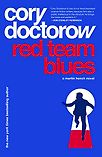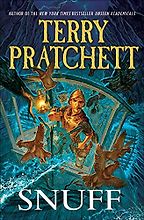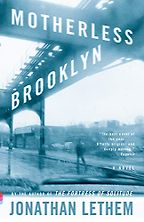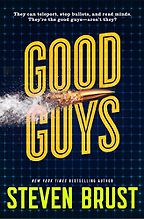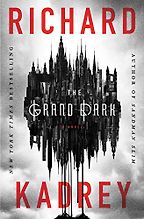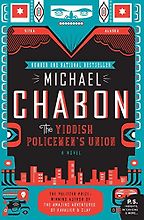Can you start by telling me broadly what genre we’re talking about today? I thought it might be noir with some fantasy thrown in or maybe even oddball crime fiction.
It’s noir. It’s noir that isn’t either ‘noir with traditional milieu and traditional private eye protagonist’ or ‘noir with modern milieu and traditional protagonist.’
The foundational building block of noir is that you have a protagonist who’s an unlicensed cop. Part of the point of the story is always that there are things that the cops can’t do because their hands are bound. There are places they can’t search, and people they can’t question. The protagonist can break in or put a gun to the bad guy’s head and make them answer questions. But, by the end of the book, the protagonist always realizes that the things they thought the cops couldn’t do were actually things the cops wouldn’t do, and that the corruption and the crime are a feature and not a bug.
This is what makes it noir. The gamekeepers are all poachers. There is no uniform system of justice that protects everyone. As Frank Wilhoit says, there is an in-group of people whom the law protects but does not bind, and an out-group whom the law binds but does not protect. That’s the thematic basis of noir, broadly.
Let’s go straight to the books you’ve chosen and how they fit into that noir theme. Your first recommendation is Terry Pratchett’s Snuff, one of his Discworld series. Tell me more.
Most people will have heard of Discworld. There are 41 books in the series. Pratchett was an amazing and prolific writer, and he got good in public. I don’t mean that snarkily. There was a time in publishing when a writer who had a middling couple of books—which were promising and good but not great—could attract an audience and build that audience, even with relatively low sales figures, and continue to be featured in bookshops and so on.
That time ended not long after Pratchett began his career, with the so-called death of the midlist. You saw a massive contraction of the number of titles being carried because of a massive consolidation in the number of stores where those books were carried. You had both consolidation in the trade, which is booksellers like Waterstones (and Borders, in the old days), and consolidation in the mass market, which is chemists, grocers, train stations, and so on.
That consolidation saw a much more high-stakes environment, where a writer who had been historically successful and had a bad outing, but even more so, writers who were at the start of their career and had a bad second book (say) found themselves unable to be carried by anyone else. Either that’s where their careers ended, or they took on pen names and restarted their careers. Pratchett is an example of what we lost with that because Pratchett’s early novels, including his early Discworld novels, are merely okay, and his later novels are great.
Snuff is one of those great ones, and it stands alone quite well. It is a cozy murder mystery set in a stately manor in the equivalent of the English countryside—a place called The Shire, in which the local magistrates are the great and the good, and in which they are all complicit in a murder. That murder is of a person who is considered subhuman, and therefore the murder is—by the lights of the town and the local system of justice—not a murder at all. At worst, it’s poaching. Someone’s taken a game animal, rather than murdered a person.
“The gamekeepers are all poachers”
The hero of this book is Sam Vimes. He’s one of the most important heroes of the Pratchett canon. He’s a cop and he’s on vacation. A delightful trope of the police procedural is the cop on vacation who stumbles upon a murder, and this novel has some of the best little tasty elements of that. His loving and quite well-drawn wife, Sybil, has told him he’s overworked and has conspired with his colleagues and his boss (who’s effectively the dictator of the city for which he is chief of police) to force him to go on vacation. Of course, Vimes immediately literally stumbles upon a murder.
The character I want to highlight here is a bit of a recurring character in Pratchett. He is a forensic accountant-turned-copper, AE Pessimal. In an earlier Sam Vimes book, Pessimal is set against Sam Vimes as his overseer, to find out about the out-of-control spending in the police force. He shows up as a pecksniff, second-guessing all of the expenditure the police force is making, and doing this very difficult job. Out of desperation, and maybe sadism, Sam Vimes sticks a truncheon in Pessimal’s hand and says, ‘You’re coming down on the line with us.’
Pessimal turns out to be someone who likes being out there. He’s got the affect of the rabbit and the spirit of the wolf, and he goes after the miscreants. But what he really specializes in is going over their finances. Repeatedly, there are Sam Vimes adventures in which he does combat against the great and the good, the elites of Pratchett’s milieu, and the coup de grâce is delivered by an accountant who goes over their books. And this, I think, is one of the best of those (another one that’s quite notable is Making Money).
In Snuff, Pessimal turns up as they are cleaning house with these corrupt local magistrates, who are also the great landowners of the territory, and figures out how they’ve also all been involved in smuggling and tax cheating and so on. That is what actually breaks the back of the conspiracy, in a way that merely holding them to account for a murder wouldn’t have done.
It can be seen as a variation of the noir formula in which the unlicensed cop thinks the cops can’t do things and then discovers that the cops won’t do things. In this case, Pessimal is coming in as an unlicensed tax inspector and doing something that I think we all can relate to in an era in which the Prime Minister is married to a non-domiciled billionaire who doesn’t pay tax: He’s turning up and taking people who, by dint of privilege and power, are spared the universal of death and taxes that everyone else is subject to, and he’s bringing them to justice. He is a beautifully drawn character, and the comeuppance is so sweet that it makes for a wonderful denouement to an absolutely stellar book.
Let’s go on to the next noir crime book on your list, Motherless Brooklyn, by Jonathan Lethem.
Lethem is quite a literary science fiction writer. He had a rocket takeoff to his career. He had written ten or so unsuccessful novels before he finally sold his first one, a noir book called Gun, With Occasional Music, that’s Raymond Chandler by way of Salvador Dali. Whatever it was he cracked in writing that book gave him the wherewithal to go back to those ten trunk novels and fix them up, and so he had this incredible firecracker string of brilliant books come out, one after the other.
At the tail end of that, we got Motherless Brooklyn, which is a story about a private eye who has Tourette’s. He is part of a gang of private eyes. They’re the muscle men, leg men, bag men and goons of a well-known private eye about Brooklyn. They are all orphans that this guy took out of an orphanage and raised to be his sidekicks. I’m not really doing this justice, because this sounds like quite a silly premise, and it is. Part of the charm of this book is its self-awareness about the silliness of this.
The book opens with their mentor and father figure, Frank Minna, going missing. It’s the story of how the Minna men—this gang, his sidekicks—try and solve the mystery of what happened to their boss. One of the things that very quickly becomes apparent is that the boss was the brains of the outfit, and none of them knows much about how to solve a mystery.
Another thing that becomes apparent is that the protagonist, who has Tourette’s and is often belittled or mocked by his peers, is the smartest of the bunch but is roundly ignored. We learn very early on that he is heartbreakingly naïve, and that his worship of his boss, his understanding of his place in the world, and the importance that he brings to his life as a Minna man are all grossly misplaced.
This is another one of those disillusionment novels. It’s not a novel about an unlicensed cop, but it is a novel about someone who thinks that they’re doing good in the world, who discovers that they have been someone else’s patsy all along.
The voice of the character is, for obvious reasons, quite distinctive and very good. Lethem is quite a lyrical, comic, and absurdist writer. His first novel, Gun, with Occasional Music, is a hardboiled mystery about furries—not humans in fur suits, but actual anthropomorphic animals—and while this is set in a gritty, contemporary Brooklyn, it’s no less willing to be a little self-deprecating, a little surreal, and quite funny. It also has quite a sting in its tail because you fall in love with this character, and you see what’s coming before he does. There’s a sense of watching the protagonist in a horror movie go into the basement, when you know what’s there but for some reason, they keep heading towards it.
Let’s go on to your next recommendation, which is Good Guys by Stephen Brust. Tell me why you like this one and what makes it noir.
Stephen Brust is an amazing fantasy writer. For literally forty years—since I was twelve years old—he has been publishing this long-running noir sword-and-sorcery series called the Vlad Taltos books. He’s nearly done with them. He’s grown to be quite a pal of mine, although he’s a good generation older than me. We have the same editor.
It is clear that Brust is deeply conflicted about finishing the series that has been his life’s work. He keeps getting stuck on it and doing other things to not write it, including writing other books. This is one of those. It’s a book about a conspiracy to do good things in the world, a conspiracy to make other people happy. It shares its lineage with a Hugo Award-winning short story by Bruce Sterling called “Maneki Neko.” It is a crossover between noir and conspiracy novels.
Conspiracies play a large part in noir. Often, the thing that’s being unwound by the noir protagonist is a conspiracy. In this case, the noir protagonist is the conspiracist. He’s part of a conspiracy, and it is in the nature of conspiracies that they often contain conspiracies of their own. They nest inner conspiracies. Think of Winston Smith meeting O’Brien in Orwell’s 1984, and discovering that the party has another sub-party within it that is a conspiracy against the party, which turns out to be a conspiracy against the conspiracy against the party. It’s those wheels within wheels that give this some of its noir flavor.
What really conveys the noir flavor, as with all of Brust’s work, is his impeccable, absolutely brilliant, dry, noir voice. It’s funny, it’s wry, it’s understated. He is a genius in every way. The language is delicious, and the dialogue and the characters are great. You want to be around a bar with this group of characters. As with every group of Brust characters, you just want to be hanging out with them in a con suite at a science fiction convention.
Brust is a musician and I’ve actually been in con suites with him and other musicians bantering, drinking, singing. He is one of those guys. He’s a bard, and the book shows it.
And it’s not just noir plus urban fantasy, there’s also murder?
Yes, the protagonist, Donovan is tasked with solving a string of increasingly grisly murders, and the result is a police procedural—with magic.
Let’s move on to The Grand Dark by Richard Kadrey.
Richard Kadrey is another one of those great, longstanding writers who found his milieu with noir. He started off as one of the OG cyberpunk writers. He has a short story in Bruce Sterling’s Mirror Shades, which is the seminal, original, genre-defining anthology of cyberpunk published in the mid-80s. He wrote a great cyberpunk novel in the 80s called Metrophage, which I read as a teenager. I actually wrote the introduction for its reissue.
Richard’s career really took off with a book called Sandman Slim, which is a noir novel. A man who’s a sorcerer is part of a magic circle in contemporary Los Angeles. The other magicians murder him, and they send him to hell, where he becomes a gladiator and pit fights for the demons. In so doing, he wins the favor of a demon prince and then steals an artifact that allows him to return to Earth and take his revenge.
That was the first volume of 13, and the series is now complete. Sandman Slim, the monster who kills monsters, the unkillable man, comes back from hell and faces a series of escalating existential challenges. He saves Los Angeles, and then he saves America, and then he saves the Earth, and then he saves the solar system, and then he saves our reality, and then he saves heaven, and then he saves hell—over and over again, in this very noir way. It’s a great series of journeys. It’s in hell, it’s in heaven, it’s in limbo, it’s in other dimensions, it’s in Los Angeles, it’s all over.
Five Books interviews are expensive to produce. If you're enjoying this interview, please support us by donating a small amount.
As he was closing in on the end of this, Kadrey must have wanted a palate cleanser. He wanted to catch his breath before he brought it in for a landing, and he wrote The Grand Dark.
This is a very fucking weird book. It’s set in an alternate interwar period. It’s an analogy to Weimar, so think of Berlin in the ’20s. War is on the horizon. The city is full of mutilated veterans, many of whom, for complex reasons related to chemical weapons, have lost some or all of their face and go about wearing tin prostheses. The city is moving from a loose post-war liberalism into a drums-of-war-beating authoritarianism. It’s a murder story about a guy who is a down-and-outer, who ends up trying to investigate a murder because he is part of the underclass to whom no one in the temporal authorities wants to pay attention.
Kadrey’s noir is Vantablack. It’s what made him such a great cyberpunk writer. He, alone among the cyberpunks, was an actual punk. That’s not quite true, because John Shirley wrote music for the Blue Oyster Cult, but Kadrey was a reformed car thief who’d done time in juvie.
His noir is pretty goddamn noir. It’s not leavened with the humor of Steve Brust. Think of a Tom Waits album that’s been dragged through the gutter, and now it skips over and over again on Tom Waits growling. That’s where we’re at with Kadrey. It’s a stunning read; it’s beautifully plotted. The setting is amazing, and it’s got some great twists.
The last noir crime novel you’ve picked is The Yiddish Policeman’s Union, by Michael Chabon. Is this one a bit different?
Yes. There is a small but important subgenre of alternate Israel novels. There’s a novel by Simone Zelitch called Judenstaat, which imagines that after the war what became East Germany instead became the Jewish homeland. It makes a certain kind of sense; you could imagine that happening.
In this one, in Chabon’s telling, it’s Alaska. It’s given over to the world’s Jews as a homeland but on a 50-year lease. The novel is set on the eve of the handback, so imagine Hong Kong in 1997. The protagonist is a policeman—not an unlicensed policeman, an actual policeman—trying to solve a murder on which the actual police authority has effectively given up, on the eve of the state’s dissolution. The murder is bound up with the overall project of pursuing a Jewish homeland, the contradictions and complexities of Zionism, its militaristic arm, its socialist arm, and the questions of what Jewish identity are.
Both Chabon and I are Jewish. I support a two-state solution in Palestine and oppose apartheid in Israel. This is a book that speaks in a very sly and important way about what it means for there to be an indigenous population in a land that is given over as a form of reparation, and how those tensions play out.
The fact that he has set it on the eve of this dissolution, this last-chopper-out-of-Saigon moment, makes for urgency. In these cases—and in every case of settler colonialism and truth and reconciliation, be that in Canada, where I’m from; in the United States, where I live; in South Africa; in Israel; in Australia—there is this temptation to kick the can down the road, to say, ‘There’s some stuff here we can’t resolve, and let’s see if time makes that easier to solve.’ But because this is the eve of the handback, all of these questions need to be resolved or forever buried.
The liquidation of this temporary arrangement creates an urgency in circumstances where, far too often, we treat urgent things as not being urgent at all. The fact that it’s a murder that no one wants to pursue, that it involves factional and sectarian differences both within the Jewish faith and within Jewish culture and politics, and that it is played out against seized indigenous land that was seized long before it became a Jewish homeland, which is part of a wider issue of colonialism and settlerism in the Americas, all makes for a really rich foment.
The voice is great. The voice is a wise, smartass, Lenny Bruce-ish, Jewish, Yiddish voice, and it’s a voice I love. I grew up speaking Yiddish. It was my father’s first language. I went to socialist Yiddish school at the Workmen’s Circle. Yiddish is an amazing language that has—even more so than English—this hybrid character. It has no formal grammar, it is all dialectical. I know we have the Queen’s English and Received Pronunciation, but those are relatively modern inventions. There is no formally correct English, Yiddish, even less so.
There’s a phrase in Yiddish that’s really telling, which is ‘he speaks a beautiful Yiddish.’ Which is to say, the speaker borrows, on the fly, words from other languages and innovates grammars and structures that incorporate those borrowed words in ways that make for delightful wordplay, that are expressive, funny, and interesting. That carries over into the book itself. It’s a very Yiddish book. It could be Sholem Aleichem in translation. Or Rosa Luxemburg, for that matter. It’s terrific.
The final thing I want to say about this novel is that it has one of Will Staehle’s all-time great covers—just an astoundingly good cover. Staehle is the artist who does all of my covers now as well. I love what he does with mine. If you want to get a sense of the versatility that Staehle has in his work, compare this cover to the cover of any of my books. You would never believe that they came from the same artist. Throw in a couple of his other ones—he does Victoria Schwab’s covers, and Charlie Jane Anders’s covers—and lay them out like a tarot deck. Ask yourself, how could one person be so versatile as to produce all of these brilliant, distinctive, extremely eye-catching covers? None of them are seemingly of a piece with each other.
You’ve just written a crime novel called Red Team Blues. Can you say a bit about it for those who haven’t read it yet? When I saw the main protagonist, Marty, was a forensic accountant, I thought, ‘Great! This is the kind of hero we need in this day and age.’
Absolutely. Someone called it Panama Papers fanfic. It’s a noir detective novel in that tradition I was talking about earlier. Marty, like Pessimal, is an unlicensed tax inspector. He’s a forensic accountant who spent forty years in Silicon Valley unwinding the weirdest, most baroque scams that tech bros can come up with. At 67, he is at the end of his career.
He, at one point, has taken in trade for his services a luxury tour bus that a rockstar had fitted out for a perpetual end-of-life tour that he reckoned he would have to take because his manager had stolen all of his money, which is a thing that actually happens to rockstars all the time. Leonard Cohen toured till he dropped dead for that reason. George Clinton’s still on the road, not merely because he’s an unstoppable funk god but because his scumbag manager stole all his money.
Marty’s 37-foot luxury tour bus is called The Unsalted Hash. He drives it from the tip of Baja, California, up to the Oregon coastline, and inland, too, taking retirement on the installment plan, working when his savings get low, and he’s called back for one last job.
An old pal, who’s a brilliant, storied cryptographer—from the days when crypto meant cryptography, not cryptocurrency—has, very unwisely, decided to float his own cryptocurrency. Because he’s very good, it becomes a very successful cryptocurrency and is soon worth more than a billion dollars. But because he is prone to the hubris of very talented people, he has hidden in this cryptocurrency system a backdoor that would allow him to move the money around, should it become necessary—should there ever be an error revealed in his maths that allows someone to start stealing things from his blockchain. What’s been stolen is the keys themselves, and with those keys the criminals can take everything—more than a billion dollars.
Of course, much of the money in that blockchain belongs to the kinds of money launderers and criminals who don’t take those losses lightly and who will hunt down Marty’s friend and flay him alive if their money goes missing. Marty agrees to find the keys, which turns out to be easier than you might imagine, because the low-level goons who are charged with stealing these keys are Millennials and so most of it just ends up on Instagram. But he then has to contend with the fact that the two criminal gangs who double-crossed each other and the various US three-letter agencies who are complicit to one degree or another in all of these shenanigans blame him.
Marty has spent his whole career playing on the red team. In security, the people who attack are the red team and the people who defend are the blue team. Attackers need to be quite methodical and uncover a single mistake that the defenders have made and figure out how to exploit it. Defenders have to be perfectly methodical and make no mistakes that the attackers can discover. When Marty goes from hunting for the keys to being hunted for having found them, he switches from the red team to the blue team—the place he does not want to be. The book is mostly the story of how he figures out how to get back on the red team and how to go after the bad guys.
It’s a very pacy novel. As you might imagine, if you’re the kind of person who writes eight books during lockdown, my partner cannot keep up with everything I do. My wife has got plenty to do. While she enjoys my books, she’s definitely not going to be able to read all of them. With this one, when I finished it, I handed it to her. I’d written it in six weeks flat. It came battering out of my fingertips.
I said, ‘Darling, I think I’ve really got something here. Would you mind reading the first couple of pages?’
I rolled over in bed at two in the morning, and she was sat up in bed with her phone.
I said, ‘What on Earth are you doing?’
She said, ‘I just had to figure out how it ended.’
Then, I sent it to my editor. My editor is a lovely chap and has edited every novel I’ve ever written. I’ve known him since I was a teenager. He’s an older brother figure to me, and we are great pals. He would not think that I was disparaging him if I were to note that he is not the world’s most reliable email correspondent. He is prone to taking a very long time to get back on routine matters. When I sent him the book, I figured it’d be a month or two before I heard back from him.
Instead, I heard back the next morning: ‘That was a fucking ride. Whoa.’ He immediately bought two more. I had just written the last adventure of Marty Hench, and now he wanted two more of them. There’s precedent for how to manage this. When Queen Victoria offered Sir Arthur Conan Doyle a knighthood to bring back Sherlock Holmes, he brought Holmes back over Rickenbacker Falls. I didn’t want to bring Marty back over Rickenbacker Falls. My editor is a very powerful man in New York publishing but he can’t offer me a knighthood.
Instead, I decided I would tell the story backwards, that I would go back in time to all of Marty’s earlier adventures. I discovered as I started doing this that there is a huge advantage to it. If you tell the story backwards, you have no continuity problems because causality runs in the other direction. If there’s a detail that appears later, you can always put it in. Backshadowing actually becomes foreshadowing when you’re writing the books backwards.
“Conspiracies play a large part in noir”
There are two prequels. The next one is The Bezzle. It will come out in February 2024. The one after that is Picks and Shovels, and it will come out in January 2025. I’m working on a couple more, and they each visit a different time in tech history—the different inflection points when we lived through these bubbles, these periods that seemed promising and sometimes were promising, including the web, the various deaths of VR, and so on and talk about what was going on in the scammiest, most self-deluded, frothiest, most bubble-licious parts of the tech sector, and how the people who dreamt of a technology that would be a force for liberation and connection contended with the money changers who showed up hoping that technology would be a source of control and extraction, and how they lost that fight, and how the forces of finance won that fight and made tech into, as Tom Eastman says, “five websites, each consisting of screenshots of text from the other four.”
With these thrillers, are you trying to educate people who don’t know about crypto and blockchain?
To a certain extent, although the point of this book is not to smuggle a tutorial in through a detective story. For one thing, it was pretty clear, even when I wrote this, that crypto was moving out of the spotlight and would wither away over the coming years. It’s really a tutorial in how technology and technical talk can be a smokescreen for all kinds of jargon. Think of the towel in Douglas Adams’s Hitchhiker’s Guide to the Galaxy. If you’ve got the towel, they’ll assume that you’ve got everything else.
We all know that technology can be transformative. We’ve all lived through multiple cycles of tech transformation, and it’s that fact that makes stories or crimes in which grifters show up and say, ‘Here is the next transformational technology,’ sound plausible. Cryptocurrency is an especially virulent version of that because it’s not just about exploiting the fact that we’ve all lived through tech bubbles, it’s also exploiting the fact that we’ve all lived through finance bubbles.
Anyone in the United Kingdom has lived through this period in which having the incredible foresight and acumen to have a place to live in the 1970s made you a multimillionaire by the 2000s. We’ve all seen multiple programs on the Beeb and Channel Four about buying and flipping homes. We all have an elderly relative who fancies themselves the second coming of Warren Buffett and think they’re quite good at picking properties, merely for having lived in a place. In a world in which sharp operators make a fortune by selling dodgy PPE down at the pub to a Tory donor, crypto seems very plausible.
I just saw an advertisement on the Tube for an unbelievably scammy digital service that lets you rent your driveway to commuters who need a place to park during the day. ‘This is a great way to make back the seven thousand pounds you lost on crypto.’ That’s the actual text of the ad. In the same way scam emails say, ‘I am a police detective investigating a scammer who ripped you off. Please get in touch with me so that I can help you get your money back.’ It’s like a filter to identify and prioritize people who are already vulnerable to this kind of scam. A scam is a way of grooming people to be scammed in the future.
That is the Western economy writ large—the American economy especially, and I think the British economy doubly so, whether that’s illegally selling PPE, or the absolute human garbage driving around in Minis emblazoned with the Foxtons logo destroying every neighborhood.
There’s a story that after the fall of the Berlin Wall and the collapse of the Soviet Union, Albania was gripped by a pyramid scheme that everyone, including the finance minister, was involved in. After it collapsed, people said, ‘we knew it was a pyramid scheme, but we figured that the finance minister would bail it out because he was involved in it. We knew it was a scam, but we thought we were on the winning side, not the losing side. We thought we were the scam artists, not the marks.’
Crypto is a way for people who are scam artists to convince other people that they can be scam artists—which is to say, successful gamblers—and in so doing, steal all their money.
I’ve never been to Silicon Valley—is Marty’s life an accurate picture of what it’s like there?
I have lived in Silicon Valley, and I tried to make it as true to the milieu as I could. That’s a thing many critics have noted favorably. Maria Farrell wrote something quite effusive about this. She’s also the person who identified that a noir story is about an unlicensed cop and that Marty’s an unlicensed tax inspector.
It is meant to capture that milieu, that place, as much as, say, The Hobbit is meant to capture The Shire. Even if you’ve never been there, it’s meant to make you understand what life there must be like.
Interview by Sophie Roell, Editor
August 12, 2023. Updated: May 29, 2025
Five Books aims to keep its book recommendations and interviews up to date. If you are the interviewee and would like to update your choice of books (or even just what you say about them) please email us at [email protected]

